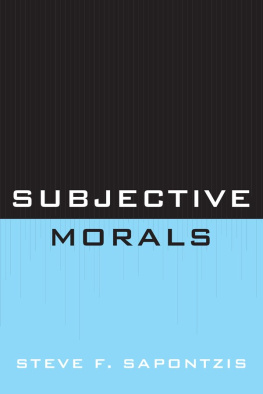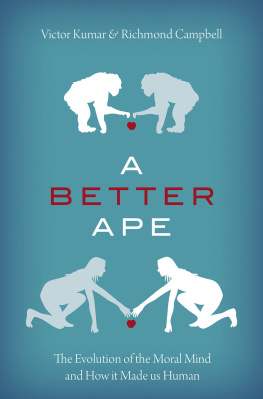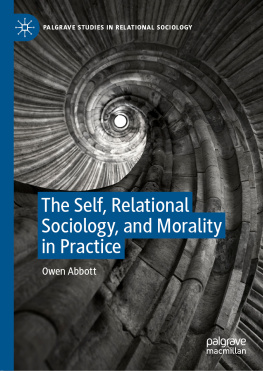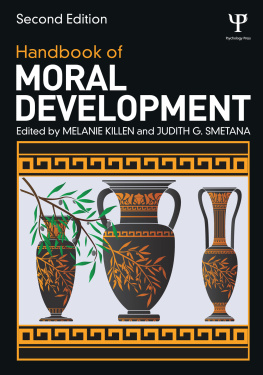The Social Psychology of Morality
Ever since Platos Republic was written over 2,000 years ago, one of the main concerns of social philosophy and later empirical social science was to understand the moral nature of human beings. The faculty to think and act in terms of overarching moral values is as much a defining hallmark of our species as is our intelligence, so Homo moralis is no less an appropriate term to describe humans as Homo sapiens.
This book makes a strong case for the pivotal role of social psychology as the core discipline for understanding morality. The book is divided into four parts. First, the role of social psychological processes in moral values and judgments is discussed, followed by an analysis of the role of morality in interpersonal processes. The sometimes paradoxical, ironic effects of moral beliefs are described next, and in the final section the role of morality in collective and group behavior is considered.
This volume will be of interest to students and researchers in the social and behavioral sciences concerned with moral behavior, as well as professionals and practitioners in clinical, counseling, educational and organizational psychology where understanding morality is of importance.
Joseph P. Forgas is Scientia Professor of Psychology at the University of New South Wales, Sydney. He received his D.Phil. degree from the University of Oxford and a D.Sc degree, also from Oxford. His research investigates affective influences on social cognition, motivation, and behavior. He has published 26 books and over 200 journal articles and book chapters. In recognition of his scientific contribution, he received the Order of Australia in 2012, as well as the APSs Distinguished Scientific Contribution Award, the Humboldt Research Prize, and a Rockefeller Fellowship. Forgas is a Fellow of the Academy of Social Sciences in Australia, the Association for Psychological Science, the Society of Personality and Social Psychology, and the Hungarian Academy of Sciences.
Lee Jussim is Professor of Psychology at Rutgers University, where he was chair from 20102013. He is the author of over 100 articles and chapters, and several books, including Social Perception and Social Reality: Why Accuracy Dominates Bias and Self-Fulfilling Prophecy, which received the 2013 AAP Prose Award for best book in psychology. His contribution to The Social Psychology of Morality was completed while he was a Fellow and Consulting Scholar at Stanfords Center for Advanced Study in the Behavioral Sciences. His current work focuses primarily on scientific integrity and best practices in science.
Paul A.M. Van Lange is Professor of Social Psychology and chair of the Section of Social and Organizational Psychology at the Vrije Universiteit Amsterdam, and Distinguished Research Fellow at the University of Oxford. His research focuses on human cooperation and trust grounded in evolutionary theorizing, particularly the functions of forgiveness, generosity, empathy, fairness, morality, retaliation, and competition. He is a recipient of the Kurt Lewin Medal and has published around 150 articles and several books, including the Atlas of Interpersonal Situations, the Handbook of Theories of Social Psychology, Power, Politics, and Paranoia, and Social Dilemmas. Van Lange was associate editor of the Journal of Personality and Social Psychology and Psychological Science, is founding editor of a series on human cooperation (published by Oxford University Press), editor-in-chief of Current Opinion in Psychology, and has served as director of the Kurt Lewin Institute (KLI) and as president of the Society of Experimental Social Psychology (SESP).

The Sydney Symposium of Social Psychology series
This book is Volume 18 in the Sydney Symposium of Social Psychology series. The aim of the Sydney Symposia of Social Psychology is to provide new, integrative insights into key areas of contemporary research. Held every year at the University of New South Wales, Sydney, each symposium deals with an important integrative theme in social psychology, and the invited participants are leading researchers in the field from around the world. Each contribution is extensively discussed during the symposium and is subsequently thoroughly revised into book chapters that are published in the volumes in this series. For further details see the website at www.sydneysymposium.unsw.edu.au
Previous Sydney Symposium of Social Psychology volumes:
SSSP 1. FEELING AND THINKING: THE ROLE OF AFFECT IN SOCIAL COGNITION** ISBN 052164223X (Edited by J. P. Forgas). Contributors: Mahzarin Banaji, Len Berkowitz, Jim Blascovich, Herbert Bless, Eric Eich, Shelly Farnham, Klaus Fiedler, Joseph Forgas, Daniel Gilbert, Anthony Greenwald, Jamin Halberstadt, Sara Jaffee, EunKyung Jo, Leslie Kirby, Mark Leary, Dawn Macauley, Leonard Martin, Wendy Berry Mendes, Paula Niedenthal, Brian Nosek, Marshall Rosier, Laurie Rudman, Carolin Showers, Craig Smith, Bartholomeu Troccoli, Timothy Wilson, and Robert Zajonc.
SSSP 2. THE SOCIAL MIND: COGNITIVE AND MOTIVATIONAL ASPECTS OF INTERPERSONAL BEHAVIOR** ISBN 0521770920 (Edited by J. P. Forgas, K. D. Williams, and L. Wheeler). Contributors: Susan Andersen, Roy Baumeister, Joel Cooper, Bill Crano, Garth Fletcher, Joseph Forgas, Mike Hogg, Pascal Huguet, Martin Kaplan, Norb Kerr, William and Claire McGuire, John Nezlek, Fred Rhodewalt, Astrid Schuetz, Constantine Sedikides, Jeffry Simpson, Richard Sorrentino, Dianne Tice, Kip Williams, and Ladd Wheeler.
SSSP 3. SOCIAL INFLUENCE: DIRECT AND INDIRECT PROCESSES* ISBN 1841690384 (Edited by J. P. Forgas and K. D. Williams). Contributors: Herbert Bless, Martin Bourgeois, Shannon Butler, Robert Cialdini, Barbara David, Ap Dijksterhuis, Lara Dolnik, Joseph Forgas, Stephen Harkins, Miles Hewstone, Michael Hogg, John Jost, Eric Knowles, Bibb Latan, Martin Lea, Jay Linn, Robin Martin, Thomas Mussweiler, Sik Hung Ng, Richard Petty, Tom Postmes, Mark Schaller, Gretchen Sechrist, Russell Spears, Charles Stangor, Fritz Strack, James Tedeschi, Deborah Terry, John Turner, Eva Walther, Susan Watt, and Kipling Williams.
SSSP 4. THE SOCIAL SELF: COGNITIVE, INTERPERSONAL, AND INTERGROUP PERSPECTIVES** ISBN 1841690627 (Edited by J. P. Forgas and K. D. Williams). Contributors: Art Aron, Roy F. Baumeister, Monica Biernat, Marilynn B. Brewer, Natalie Ciarocco, Anna Clark, Joel Cooper, Christian S. Crandall, Joseph P. Forgas, Thomas Gilovich, Edward R. Hirt, Michael Hogg, William Ickes, Emiko Kashima, Yoshihisa Kashima, Marianne LaFrance, Mark Leary, Diane M. Mackie, Bertram F. Malle, Sean M. McCrea, Stephanie J. Moylan, Sabine Otten, Cynthia L. Pickett, Frederick Rhodewalt, Brandon J. Schmeichel, Constantine Sedikides, Eliot R. Smith, Dianne M. Tice, Michael Tragakis, Linda R. Tropp, Jean M. Twenge, and Stephen C. Wright.
SSSP 5. SOCIAL JUDGMENTS: IMPLICIT AND EXPLICIT PROCESSES** ISBN 0521822483 (Edited by J. P. Forgas, K. D. Williams, and W. Von Hippel). Contributors: Herbert Bless, Marilynn Brewer, David Buss, Tanya Chartrand, Klaus Fiedler, Joseph Forgas, David Funder, Adam Galinsky, Martie Haselton, Denis Hilton, Lucy Johnston, Arie Kruglanski, Matthew Lieberman, John McClure, Mario Mikulincer, Norbert Schwarz, Philip Shaver, Diederik Stapel, Jerry Suls, William von Hippel, Michaela Waenke, Ladd Wheeler, Kipling Williams, and Michael Zarate.
SSSP 6. SOCIAL MOTIVATION: CONSCIOUS AND UNCONSCIOUS PROCESSES** ISBN 0521832543 (Edited by J. P. Forgas, K. D. Williams, and S. M. Laham).









